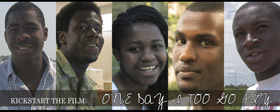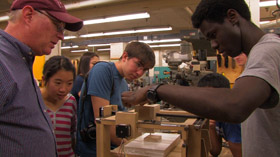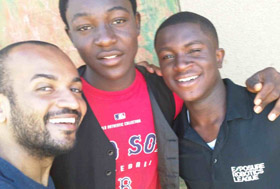Alum's Documentary Captures Lives of African MIT Students—and Reveals Modern Africa
-
-
slice.mit.edu
- 7
Filed Under
Recommended
 The students featured in the film, from left: Fidelis Chimombe (Zimbabwe), Mosa Issachar (Nigeria), Sante Nyambo (Tanzania), Billy Ndengeyingoma (Rwanda), and Philip Abel (Nigeria). Filmmaker Arthur Musah '04, MNG '05 has launched a Kickstarter campaign
The students featured in the film, from left: Fidelis Chimombe (Zimbabwe), Mosa Issachar (Nigeria), Sante Nyambo (Tanzania), Billy Ndengeyingoma (Rwanda), and Philip Abel (Nigeria). Filmmaker Arthur Musah '04, MNG '05 has launched a Kickstarter campaign
His film, One Day I Too Go Fly,follows students from Tanzania, Nigeria, Rwanda, and Zimbabwe as they seek to become engineers—they are majoring in civil engineering, chemical engineering, and electrical engineering and computer science—and make their way in America. Filming in Cambridge and in Africa, Musah aims to uncover how the relationships these students have with their home countries evolve and how their time at MIT influences their dreams to make an impact on the world.
Musah began shooting in August 2011, when the students touched down at Logan airport. He's received MIT's permission to film on campus (something Hollywood studios typically don't get) and has equipped each student with a portable camcorder for making video diaries.
"I think the intimacy of the stories I’m following will make them connect with anyone of any nationality," Musah says. "But I also think that observing how these teenagers transform into adults within the MIT context will provide some insight into a modern Africa, whose inventive and ambitious youth are not satisfied to rely on others to determine their countries’ and their continent’s destinies." Take a look at the trailer below.
"I plan to follow the students on the most intriguing tangents their lives take, be they in Africa, Asia, Europe, or elsewhere," Musah says. This past summer, he spent two weeks in Nigeria following one student as he taught his newly acquired technical skills to Nigerian high schoolers in a revolutionary robotics program run by other MIT students. The experience will be a short spin-off documentary he's hoping to complete in a year. Read more about it in the Q&A below.

Musah plans another trip to Africa to film the other students interacting with their families and home communities and engaging in tech projects there, assuming he can raise the funds via his Kickstarter campaign.
The film is a labor of love for Musah—and a second job. He supports himself as a software engineer and carefully plots his vacation days for overseas production work. Donations to the Kickstarter campaign, which will fund the upcoming year of the project, are accepted until the morning of Dec. 19.
The film is Musah's first feature-length project, though his other films have also explored issues of identity shaped by different worlds, often Africa and North America. Learn about his earlier film work in this Slice post.
Musah is aiming for a June 2016 completion date for One Day I Too Go Fly. What's it like filming a documentary over four years? Read the production blog, and learn more in the Q&A below.
Q&A with filmmaker Arthur Musah ’04, MNG ’05
This film is inspired by your own experience of coming from West Africa to study at MIT. How have the students' experiences compared to yours? Musah: The students now seem to be a lot more plugged in overall. I think it’s partly a consequence of how pervasive the internet and social media are in Africa today. Most of them were on Facebook before they arrived. I think participating in this global discourse has accelerated parts of the process of adapting to a foreign society for them. Sante is an avid tweeter, for example. The US and its culture aren’t as strange to these students as they were to my African classmates and me. We never joined frats or sororities because the culture wasn’t a fit, but most of these students are members of Greek communities.
At the same time, the five students I’m following come from diverse backgrounds and these are sometimes reflected in how easily or not they adapt to aspects of American society.
I also think MIT has changed since my days there and that influences their experience. One example is that I see a big emphasis on entrepreneurship at MIT these days. That emphasis led Billy to attend the Sloan Africa Business Conference in his freshman year. I don’t think there was such a conference at MIT when I was a student. I only attended the flagship Harvard version of the conference after I had graduated from MIT, probably because I never knew about that before.
Have any themes emerged yet? Musah: A lot of what resonates with me in the footage so far has to do with transformation and soul-searching. Questions like: I had perfect SAT scores but failed a course at MIT, does that mean I can’t be an engineer? Or, I used to think Mugabe’s [President of Zimbabwe Robert Gabriel Mugabe's] one redeeming quality was his unacceptance of homosexuality, but my frat brother just came out to me and Obama just endorsed gay marriage, what do I really think about the issue?
They notice they are changing, and that can be unsettling. Philip made a trip home this summer and was struck by how small everything felt after a year away. What will be his relationship with his hometown after exploring the world at large? Sante asked her mom to send more art from home to fill her room with to make it more “Africanish.” It’s her way of clinging to the Tanzania she loves and misses and on some level is afraid of becoming estranged from.
What are some of the challenges you've faced in pursuing this project? Musah: Funding primarily. This summer, because of financial constraints, I had to choose between Fidelis’s research trip to Asia to study the growing Chinese involvement in Africa or Philip’s trip Nigeria. For a number of reasons, the trip to Nigeria won, but it would’ve been great to do both. Hence the Kickstarter fundraiser.
Also, the long production timeframe has been tough. It’s challenging to keep up with the dynamic lives the students lead at MIT, to strike a balance between keeping up and being intrusive. You have to be picky with what you choose to follow. Staying alert and focused so long is a challenge, but the challenge also makes the pursuit worthwhile. Going through MIT teaches you grit, so I have that to rely on.
What have you learned during this project? Musah: Honestly I think I’ve discovered my purpose—to document Africa. I come from a complex and exciting continent with a dizzying volume of untold stories, and the opportunity to tell them thrills me. For a number of years after MIT I think I lost sight of this urge African youth have to participate in the world and contribute to progress in our countries. This project is reconnecting me with fellow Africans pursuing Africa’s renaissance. I’ve seen friends pack up their bags after a decade in the US and return to Africa as entrepreneurs. Even those who remain in the diaspora have become bridges. I feel rejuvenated and reconnected to my original ambitions. Africans are hungry, but not in the ways the world is used to seeing us; we are hungry to take charge of our destinies, and that’s what we’re doing.
Exposure Robotics League
 Cofounded by Nigerian MIT students, the Exposure Robotics League seeks to transform Nigerian education with an intense, five-week student enrichment summer program designed to teach robotics, programming, and other related academic principles. Musah documented the pilot program and plans to create a short film of the experience. Read more about what he witnessed.
Cofounded by Nigerian MIT students, the Exposure Robotics League seeks to transform Nigerian education with an intense, five-week student enrichment summer program designed to teach robotics, programming, and other related academic principles. Musah documented the pilot program and plans to create a short film of the experience. Read more about what he witnessed.You dug into your savings and took all your vacation time to embed with the program for 10 days. Was it worth it? Musah: Absolutely. The robotics program was a novel idea for Nigerian education, so it was a significant event. It was being organized entirely by Nigerian MIT students and sponsored by Nigerian companies, which would make it an empowering story about Africa. It was the premier run of the project, meaning there would be challenges, which are essential to an effective story because we love to see characters tested. And it would end in a competition, which would provide a dramatic climax. I thought it had the right ingredients for a short film, and what transpired did not disappoint.
Did you have any expectations about what you'd be filming while in Nigeria? If so, how were those confirmed or challenged? Musah: What I didn’t expect was to get so many perspectives on Nigeria today. Everyone had some insight to offer about the state of their country—from the high schoolers learning robotics for the first time, to the workers in the hostel that housed us, to the taxi driver that showed me around Lagos, to the American-born MIT instructor experiencing the land of her parents for the first time. Those perspectives are going to be an essential part of the short film.
What themes have started to emerge for the film? Musah: I think the strongest theme is that of rejuvenation, or as someone recently put it, of Africa Rising in spite of persisting challenges.
What will viewers get out of it? Musah: It’s a story of youthful ingenuity and entrepreneurship, an example of how schools like MIT equip students to go out into the world and try to make it better. I think it will also be a unique glimpse of what it means to be Nigerian today.








Comments
Jan
Mon, 11/26/2012 4:42pm
How fascinating! I look forward to seeing more of the fruits of this labor. I will also definitely be contributing toward ensuring this project reaches a satisfying conclusion.
Arthur Musah
Tue, 12/10/2013 11:40am
Hi Brian, you can tune in to the making of this documentary via our facebook posts at: https://www.facebook.com/OneDayITooGoFly. We're headed to film in Rwanda over the upcoming Christmas break. Hope to keep inspiring you!
Brian kileo
Tue, 12/10/2013 11:17am
It is really inspiring to know the lifes and hardships faced by African students abroad
Arthur Musah
Mon, 11/26/2012 5:28pm
Glad to hear of your enthusiasm, Jan! We'll be posting more information and updates about the project on the Kickstarter page over the course of the campaign. Stay tuned, and we welcome your feedback.
Arthur Musah
Mon, 11/26/2012 1:56pm
Thank you for featuring the project and the campaign!
Arthur Musah
Wed, 07/26/2017 11:27am
A quick update: 5 years on, we have completed filming. We're entering post-production. Learn more and support here: https://www.kickstarter.com/projects/arthurmusah/one-day-i-too-go-fly-documentary-post-production
Thanks!
Arthur
Helen W. Samuels
Tue, 06/13/2017 3:55pm
Arthur,
What a wonderful project!! Can't wait to see - One Day I Too Go Fly.
Keep us posted!!!
Helen and Greg